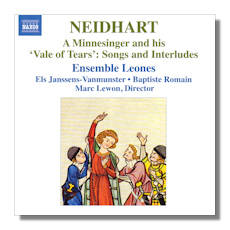
The Internet's Premier Classical Music Source
Related Links
-
De la Halle Reviews
Reuenthal Reviews
Vogelweide Reviews - Latest Reviews
- More Reviews
-
By Composer
-
Collections
DVD & Blu-ray
Books
Concert Reviews
Articles/Interviews
Software
Audio
Search Amazon
Recommended Links
Site News
 CD Review
CD Review
A Minnesinger And His Vale Of Tears

Songs & Interludes
- Baptiste Romain:
- Der han
- Clausula
- Non veul mari
- Neidhart von Reuenthal:
- Mir ist ummaten leyde
- Summer unde winder
- Sinc an, guld'n huon!
- Willekomen sumerweter süeze
- Guoten wib wol uch der eren
- Ich claghe de blomen
- Der hedamerschol
- Allez daz den sumer
- Walther von der Vogelweide: Vil wol gelopter got
- Adam de la Halle: Je muir, je muir
Ensemble Leones
Naxos 8.572449
Among of the first things that will strike you on listening to this highly enjoyable collection of the works of the Minnesinger, Neidhart von Reuenthal (c.1185-1240), and his (near) contemporaries is the focus, the clarity of projection, the paring down to his and their essential musicality by Ensemble Leones (Els Janssens-Vanmunster, voice; Baptiste Romain, vielle & bagpipe; Marc Lewon, voice, lute, vielle). For theirs is a highly idiomatic and persuasive set of arrangements on this appealing CD from Naxos. This is music that is almost necessarily "arranged" for suitable instruments. It's not always completely clear where the work of Neidhart ends and that of his arranger(s) – chiefly Marc Lewon – begins. Nevertheless, arranging 800 years later can all too easily be made to sound either more antique or more in keeping with a twenty-first century imagination than does the original music justice. In fact, its multi-layered aspects (see below) require such simplicity.
Instead, the effective singing voices of Els Janssens-Vanmunster and Marc Lewon (who also plays both lute and vielle) and the vielle and bagpipe of Baptiste Romain consistently yet unselfconsciously direct our attention to the at times almost slightly naïve – certainly somewhat resigned – tenor of these beautiful songs… Willekomen sumerweter süeze [tr.6], for instance, makes no attempt to overplay its simple message: summer is here but the joys it brings seem somehow transitory. Neidhart earned his epithet, von Reuenthal, (literally "vale of tears") somewhat erroneously in the 19th century. It's preferable, rather, to understand his musical and ideological stances in their own right: those of a somewhat detached observer of medieval life in the way that Chaucer was, or Boccaccio.
Indeed, throughout this just over an hour-long CD, there is an element of surprise – almost… "this is how I see the world, in all its beauty and wonder. My response to what I see is as valid as what I see". If you accept that we've in part lost that relationship with the world, it's all the more difficult to recreate it in performance now. But a humility and technical expertise by the members of Ensemble Leones work admirably and drive completely into the essence of this wonderful music. Their tempi and phrasing balance contemplation with certainty, wonder with forbearance, and the articulation of the texts – as said, clarity itself – produces the most felicitous and persuasive blend of acceptance with humor. These are songs that are built upon a Vale of Tears, for sure. But as Gegensang, anti-Minnesang. The conventions of courtly love and the troubadours are turned on their head. Not as pastiche or overdone parody. Still less as satire. But surely inviting – as did Shakespeare – his noble listeners to examine how far from the ideals celebrated in their culture they had departed. Neidhart's protagonists are the rural poor with apparent pretensions to such courtly ideals. Yet they fail.
But the complexity goes deeper still: Neidhart tended to classify songs into Winter and Summer "moods" with many of the obvious (and some less obvious) connotations. So there is a kind of "code" of associations, hints, direct criticism and endorsement of mores, glosses, commentaries and self-expression. But all filtered, one knows, through the mind of a very astute and sensitive observer. It is exactly this complexity in all its paradoxically simple demonstration that the three performers of Ensemble Leones have achieved so effectively and seemingly effortlessly here. Their own singing bridges the gap between sharp observer and imaginative creator: they make both necessary. Yet fresh. The manuscript the Ensemble has used is the earliest surviving collection, the Frankfurt Neidhart-Fragment of about 1300. Given its poor and incomplete state of preservation, substantial reconstruction has been necessary.
The CD's booklet is informative, particularly on this text and its provenance, use and adaptation; it's well up to Naxos' usual standards. The full texts of all the works on the CD can be downloaded as a PDF accessible from http://www.naxos.com/libretti/572449.htm. The acoustic is everything one would expect: close, clear and plain. Works by Walther von der Vogelweide and Adam de la Halle are included for contrast – as are tracks where performance owes as much to the vision thereof of Baptiste Romain as to the music and poetry of Neidhart directly. If this is repertoire, previous experience of which has even remotely pleased, then don't miss this CD. For specialists and lovers of this aspect of musicology, it must be bought and explored repeatedly. Highly recommended.
Copyright © 2012, Mark Sealey.





















